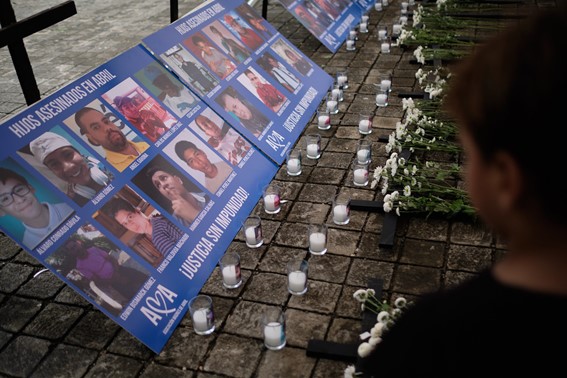27 de mayo 2022

Ortega Grants Chinese Company a Huge Mining Concession

PUBLICIDAD 1M
PUBLICIDAD 4D
PUBLICIDAD 5D
Human rights advocates recommend continuing the investigations, by building on work already done by the international community

Human rights advocates recommend continuing the investigations
On May 24, the United Nations Human Rights Council officially released the names of the three experts assigned to gather full information on the national crisis in Nicaragua. The group is charged with investigating and clarifying an entire “universe of serious violations” that haven’t been documented, affirmed human rights advocates. If the Nicaraguan regime, led by Daniel Ortega and Rosario Murillo, denies them entry into the country, they will begin work “based on other reports” that were already generated by the inter-American system.
The group of experts will be headed by Germany’s Jan-Michael Simon, together with Alexandro Alvarez from Chile and Angela Maria Buitrago from Colombia. These three are very familiar with the Central American region and possess all the skills needed to systematically document the serious human rights violations that occurred in Nicaragua, noted Juan Pappier, senior researcher for the Americas Division of Human Rights Watch.
Former Guatemalan prosecutor Claudia Paz y Paz was part of the Interdisciplinary Group of Independent Experts (GIEI) that was in Nicaragua in 2018. She believes that the creation of this new group of experts represents a “great opportunity” to investigate the crimes that occurred in the country after May 30, 2018, the day the GIEI’s mandate for investigation expired.
“The violence occurred in several stages after May 30 [which haven’t been systematically documented],” commented Paz y Paz. “All the assassinations and executions that occurred during the ‘Operation Clean-up’; all the human rights violations related to the arbitrary detention of the political prisoners; violation of due process guarantees; the ongoing criminalization [of anything that opposes the government]; torture; harassment … All these abuses have continued, but we couldn’t investigate given that time limit,” she added.
“It’s very important to build on the foundation already created by the international community,” Pappier declared. Fortunately, the three people commissioned with the task – especially Alexandro Alvarez, who was also part of the GIEI in 2018 – “are very familiar with the work that the international community has already been doing to document the human rights violations in Nicaragua,” he observed.
All three members of the group are experts in Criminal Law “who know about the [functioning of] repressive power apparatuses and are well positioned to analyze how the basic human rights principles are violated through Nicaragua’s repressive structures,” Juan Pappier continued.
The former Guatemalan special prosecutor considered that even if this group of experts doesn’t manage to enter Nicaraguan territory, they can do some of their research using reports from other organizations. For example, she noted groups “like the Nicaragua Nunca + Human Rights Collective, that has interviewed torture survivors and people who have been imprisoned.”
Pappier added other ideas. Likewise, the group of experts can “interview the many thousands of Nicaraguans who’ve had to flee their country. They can also get access to the criminal files through the lawyers that represent the victims, and those indicted in these fabricated cases based on political persecution. They can also access photos and videos (…) definitely, there’s a broad menu of tools this group of experts can use to document the situation in Nicaragua.”
Both human rights defenders feel that even though the Ortega-Murillo regime has demonstrated “that they’re not interested in international scrutiny”, they’re very wrong to refuse to receive this group of experts that was created with the backing of most of the Latin American democracies and the European Council.
Claudia Paz y Paz also felt that the reconstruction of cases and documentation of what happened will be “an enormous support” for establishing truth, especially since – paradoxically – the regime attempts to portray themselves “as the victims.” A group of experts with these qualities and international prestige “can offer an enormous contribution to the truth about what really occurred, who were the victims, and what crimes were committed,” she emphasized.
Nonetheless, “this group of experts alone won’t be able to stop these outrages of Ortega and Murillo,” Pappier insisted. “This group of experts is useful for tracing a path towards justice in the future; they’re important to show that the international community continues to be concerned about Nicaragua; and their work will serve to increase pressure. … But they don’t have the reach to put the brakes on a dictatorship that’s running amok, that knows no limits and that’s willing to do anything to remain in power indefinitely,” he cautioned.
In the last four years in Nicaragua, there’ve also been “absolute restrictions on liberty: restrictions to the freedom of association; restrictions to freedom of expression; there’s an entire catalogue of human rights violations that needs to be documented. These contributions to the truth can contribute in the medium term to guarantee the victim’s access to justice,” Juan Pappier concluded.
This article was originally published in Spanish in Confidencial and translated by Havana Times
Archivado como:
PUBLICIDAD 3M
Confidencial es un diario digital nicaragüense, de formato multimedia, fundado por Carlos F. Chamorro en junio de 1996. Inició como un semanario impreso y hoy es un medio de referencia regional con información, análisis, entrevistas, perfiles, reportajes e investigaciones sobre Nicaragua, informando desde el exilio por la persecución política de la dictadura de Daniel Ortega y Rosario Murillo.
PUBLICIDAD 3D